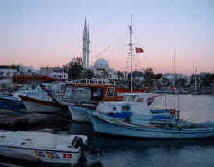
Wife of the nation's father
Jun 22nd 2006 | ANKARA
From The Economist print edition
A new book on an old taboo
NEARLY seven decades after his death, Kemal Ataturk, the westernising founder of modern Turkey, remains a near-deity for millions of Turks. His steely-grey eyes stare out of portraits hung in every school and government office; his sayings are etched on monuments and even mountains. Insulting Ataturk can bring up to three years in jail. Changing that is one of many tough requirements on Turkey's road to the European Union.
An encouraging if modest step comes with a new biography of Ataturk's wife, Latife Ussaki, by a veteran journalist, Ipek Calislar. Ever since Ataturk divorced her in 1925, Turks have been fed images of a shrill, bossy and ugly woman, who lacked the will and wiles to manage her heroic husband and was therefore to blame for the collapse of their stormy two-year marriage. Mrs Calislar's diligent research and testimony from friends and family paints a different picture of the plucky, unveiled 23-year-old, who won the heart of the nation's ruler.
The daughter of a rich merchant from Izmir, who had studied law in Europe, Latife played a bigger role than has ever been acknowledged in helping to shape Ataturk's vision of a modern Turkish state. A vocal feminist, she pushed hard for the laws that enfranchised women in Turkey long before France or Switzerland. Ataturk was so proud of Latife that he would tour with his unveiled bride throughout Anatolia, touting her as a role model for Turkish women. So what went wrong?
Latife never told her side of the story, mainly out of loyalty to Ataturk but also out of fear. The shroud of mystery was set to be unveiled when a 25-year-old court order banning the publication of her diaries and letters kept in the vaults of Ankara's Turkish History Foundation expired last year. But the family refused to
publish the papers so as to protect Ataturk's image.
One issue may have been Ataturk's nightly drinking sessions with his chums, which were widely known but rarely discussed. They clearly played a part in the break-up. So did the sudden appearance of Fikriye, Ataturk's former mistress, who shot herself in the grounds of the presidential palace. But Mrs Calislar hints at another reason: for all his westernising zeal, Ataturk was ultimately unable to cope with a wife who insisted on being his equal. "He was", notes Mrs Calislar, "a man, after all."

